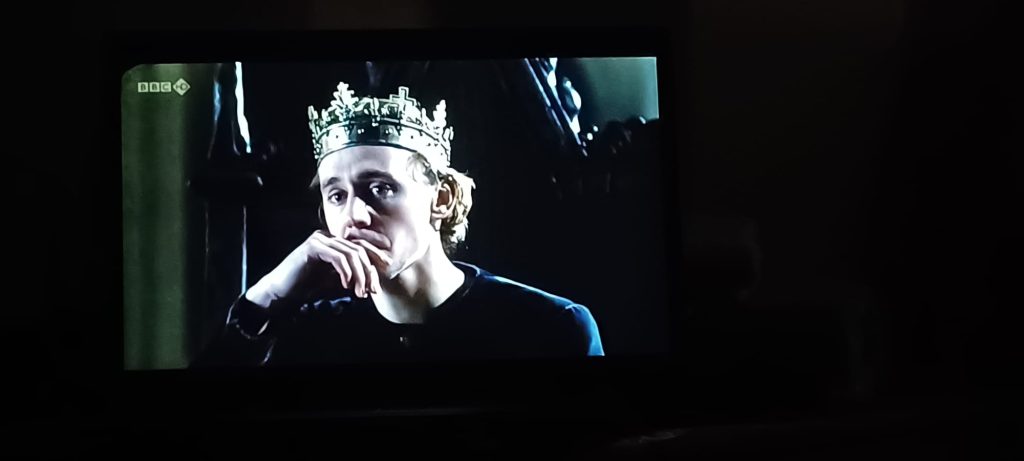
Friends, Romans, lend me your ears! I am almost done with the Shakespeare project!
More than eighteen months later and after a few false starts prior to that, I am coming close to having closely read (and wherever possible, watched in tandem) every single one of the thirty-nine plays attributed to William Shakespeare. If I were to do it all over again (which I’m not), I would have scheduled more time, taken time to find good productions to watch in conjunction with my reading, and most importantly, arranged the plays for my review first in chronological order, but then interrupting chronology as needed when logic demands it.
This was very much the case with King Henry IV, Part 2 (which, due to those Roman numerals and some mild but persistent confusion, I routinely confused with King Henry VI, which features Parts I, II, and III, and a lot of murder). The only sequel in the Shakespearean theatrical oeuvre, I covered King Henry IV Part 1 in February 2022 in between soaks in an incredible thermal spa in the north of Italy where Mussolini’s relatives still hang his portraits and Petrarch’s house in Arqua, high in the Euganean Hills, closed its gate in our faces because we arrived too late to enter.
By August 2023, I remembered very little of what happened in the first play, save a tremendous dissolution in the bar in Eastcheap, Mistress Quickly, and my first acquaintance with the character of Falstaff. Hal drinking a lot with his friends, and avoiding his father and court.
Fortunately, the Henriad productions by the BBC in 2016 came to my coherent rescue. I do so appreciate a cogent and modern treatment of Shakespeare, faithful to the original but appropriately updated for relevance. Soon I was back on track with the right Henry. In the BBC’s most recent King Henry IV Part 2, Tom Hiddleston (pictured above) stars as Prince Hal, the rogue with the character arc who becomes Henry V at the end of the play, and Jeremy Irons as his long-suffering and chronically ill father, Henry IV. (Michelle Dockery of Downton Abbey fame does a nice turn as the slain Hotspur’s bereaved widow. And apparently Tom is some kind of action movie hero, but I don’t watch wide-release film much, so I prefer to keep him in my mind as an indie and stage actor.)
The King Henry IV plays are excellently suited for high school and college age students. They treat sensitively and honestly the struggle to grow from teen to young adult, confronting all manner of temptations as does Prince Hal. Parental expectations and disappointments weigh heavy on the king’s heart. Hal comes to London for dinner but doesn’t notify his parents. Hal hangs out in centers of leisure, trading barbs and wit, which works until he literally eavesdrops on Falstaff and learns what the old buffoon really thinks of him.
Which brings us to Falstaff. What the hell, Falstaff? Did the Good Queen Bess really delight so in this character, and if so, why? He’s old, fat, with a squandered wit, mumbling and careening from mess to mess of his own making. He’s not sexy but seemingly every bar wench wants to take him to her sweaty sheets. He’s perennially out of pocket, wheedling favors from those above him, using his influence and loyalties both noble and petty to keep afloat his cult of personality. Endless cups of sack when his purse contains only pennies and groats. For Falstaff, age has not brought wisdom. And yet the piper will be paid.
Do you set down your name in the scroll
of youth, that are written down old with all the
characters of age? Have you not a moist eye, a dry
hand, a yellow cheek, a white beard, a decreasing
leg, an increasing belly? Is not your voice broken,
your wind short, your chin double, your wit single,
and every part about you blasted with antiquity?
And will you yet call yourself young? Fie, fie, fie, Sir
John. – Chief Justice, to Falstaff, Act I, Sc. 2
There is a battle scene, in which Falstaff improbably appears, fully armed. I mean …. I just do not get Falstaff.
Cleverly, Rumour personified both opens and closes the play, for what is the play about if not reputation? How it is gained, lost, burnished, maintained, and burned weaves as a theme through the play, and in the end, it is Falstaff and his companions who are banished from the kingdom by word from the king, who (incredibly) pauses in his own coronation ceremony to mete out this proclamation. Out they go, to lands far afield, to reform themselves and eventually ask to be readmitted to good grace. King Henry IV wears the crown, to reappear in King Henry V (someone explain to me how this is not another sequel.)
Next up, King Lear!



